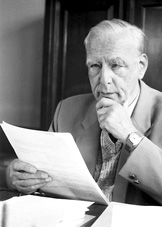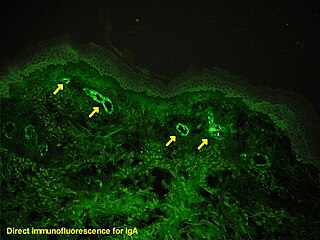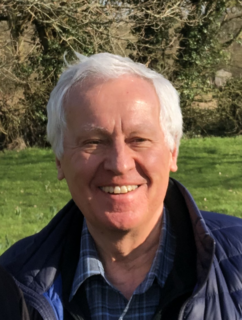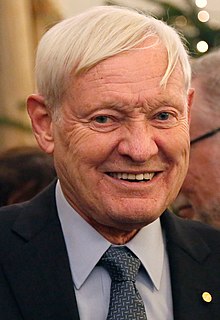
Ernst August Friedrich Ruska was a German physicist who won the Nobel Prize in Physics in 1986 for his work in electron optics, including the design of the first electron microscope.

Immunofluorescence is a technique used for light microscopy with a fluorescence microscope and is used primarily on microbiological samples. This technique uses the specificity of antibodies to their antigen to target fluorescent dyes to specific biomolecule targets within a cell, and therefore allows visualization of the distribution of the target molecule through the sample. The specific region an antibody recognizes on an antigen is called an epitope. There have been efforts in epitope mapping since many antibodies can bind the same epitope and levels of binding between antibodies that recognize the same epitope can vary. Additionally, the binding of the fluorophore to the antibody itself cannot interfere with the immunological specificity of the antibody or the binding capacity of its antigen. Immunofluorescence is a widely used example of immunostaining and is a specific example of immunohistochemistry. This technique primarily makes use of fluorophores to visualise the location of the antibodies.
The Max Planck Institute for Molecular Genetics is a research institute for molecular genetics based in Berlin, Germany. It is part of the Max Planck Institute network of the Max Planck Society for the Advancement of Science.

Richard Henderson is a Scottish molecular biologist and biophysicist and pioneer in the field of electron microscopy of biological molecules. Henderson shared the Nobel Prize in Chemistry in 2017 with Jacques Dubochet and Joachim Frank.

Stefan Walter Hell HonFRMS is a Romanian-German physicist and one of the directors of the Max Planck Institute for Biophysical Chemistry in Göttingen, Germany. He received the Nobel Prize in Chemistry in 2014 "for the development of super-resolved fluorescence microscopy", together with Eric Betzig and William Moerner.

Daresbury Laboratory is a scientific research laboratory based at Sci-Tech Daresbury campus near Daresbury in Halton, Cheshire, England. The laboratory began operations in 1962 and was officially opened on 16 June 1967 as the Daresbury Nuclear Physics Laboratory by the then Prime Minister of United Kingdom, Harold Wilson. It is operated by the Science and Technology Facilities Council, part of UK Research and Innovation. As of 2018, it employs around 300 staff, with Professor Susan Smith appointed as director in 2012.
Richard D. Leapman, Ph. D is an English physicist, and current scientific director of National Institute of Biomedical Imaging and Bioengineering (NIBIB), since October 2006 and a chief of the laboratory of bioengineering and physical science. Dr. Leapman's research interests are in the development and application of quantitative electron microscopy and the application of novel nanoscale imaging methods to solve problems in structural and cellular biology.

Nestor J. Zaluzec is an American scientist and inventor who works at Argonne National Laboratory. He invented and patented the Scanning Confocal Electron Microscope. and the π Steradian Transmission X-ray Detector for Electron-Optical Beam Lines and Microscopes.
Christoph Cremer is a German physicist and emeritus at the Ruprecht-Karls-University Heidelberg, former honorary professor at the University of Mainz and was a former group leader at Institute of Molecular Biology (IMB) at the Johannes Gutenberg University of Mainz, Germany, who has successfully overcome the conventional limit of resolution that applies to light based investigations by a range of different methods. In the meantime, according to his own statement, Christoph Cremer is a member of the Max Planck Institute for Chemistry and the Max Planck Institute for Polymer Research.
Xiaowei Zhuang is a Chinese-American biophysicist who is the David B. Arnold Jr. Professor of Science, Professor of Chemistry and Chemical Biology, and Professor of Physics at Harvard University, and an Investigator at the Howard Hughes Medical Institute. She is best known for her work in the development of Stochastic Optical Reconstruction Microscopy (STORM), a super-resolution fluorescence microscopy method, and the discoveries of novel cellular structures using STORM. She received a 2019 Breakthrough Prize in Life Sciences for developing super-resolution imaging techniques that get past the diffraction limits of traditional light microscopes, allowing scientists to visualize small structures within living cells. She was elected a Member of the American Philosophical Society in 2019 and was awarded a Vilcek Foundation Prize in Biomedical Science in 2020.
Peter John Goodhew is an electron microscopist who has published extensively on metallic and semiconducting materials and has authored or co-authored several widely used books on transmission electron microscopy. He was the leader of the UK SuperSTEM project at the STFC Daresbury Laboratory for ten years and has been Dean of Engineering and Pro-Vice-Chancellor at the University of Liverpool.

Ondrej L. Krivanek FRS is a Czech/British physicist resident in the United States, and a leading developer of electron-optical instrumentation. He won the Kavli Prize for Nanoscience in 2020 for his substantial innovations in atomic resolution electron microscopy.
Satyajit Mayor (born 1963) is an Indian biologist. He serves as director of the National Centre for Biological Sciences, Bangalore. Mayor is the former director of the Institute for Stem Cell Biology and Regenerative Medicine (inStem) at Bangalore which has a focus on the study of stem cell and regenerative biology.

Robert Eric Betzig is an American physicist who works as a professor of physics and professor of molecular and cell biology at the University of California, Berkeley. He is also a senior fellow at the Janelia Farm Research Campus in Ashburn, Virginia.
The Centre for Genomic Regulation is a biomedical and genomics research centre based on Barcelona. Most of its facilities and laboratories are located in the Barcelona Biomedical Research Park, in front of Somorrostro beach.
Arto V. Nurmikko, a native of Finland, is a L. Herbert Ballou University Professor of Engineering and Physics at Brown University. He received his degrees from University of California, Berkeley, with postdoctoral stays at MIT and Hebrew University. Professor Nurmikko conducts research in neuroengineering, brain sciences, nanophotonics and microelectronics, especially for the translation of device research to new technologies in biomedical, life science, and photonics applications.

Joachim Frank is a German-American biophysicist at Columbia University and a Nobel laureate. He is regarded as the founder of single-particle cryo-electron microscopy (cryo-EM), for which he shared the Nobel Prize in Chemistry in 2017 with Jacques Dubochet and Richard Henderson. He also made significant contributions to structure and function of the ribosome from bacteria and eukaryotes.

Jacques Dubochet is a retired Swiss biophysicist. He is a former researcher at the European Molecular Biology Laboratory in Heidelberg, Germany, and an honorary professor of biophysics at the University of Lausanne in Switzerland.
Ibrahim I. Cissé is an Nigerian-American biophysicist. He is currently director of the Max Planck Institute of Immunobiology and Epigenetics. Previously, Cissé was at the California Institute of Technology as Professor of Physics and the Massachusetts Institute of Technology as Professor of Physics and Biology. He has won several awards for his work, including in 2021 the MacArthur Fellowship.
Izzy Jayasinghe is a senior lecturer in the Department of Molecular Biology and Biotechnology at the University of Sheffield and the leader of the Applied Biophotonics Group. Her research focuses on super resolution microscopy, biophysics, cardiac muscle and microscopy instrument development. In addition to her scientific research and teaching, she is a strong advocate for gender equality and diversity in academia.









